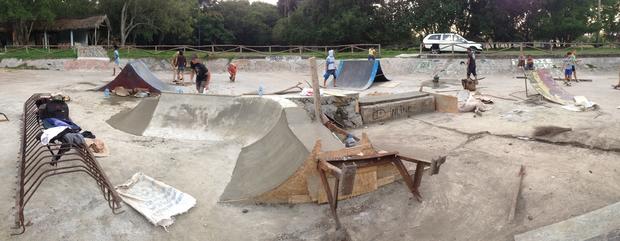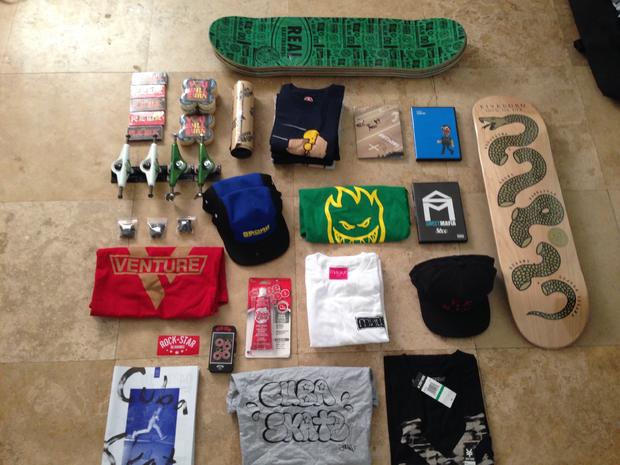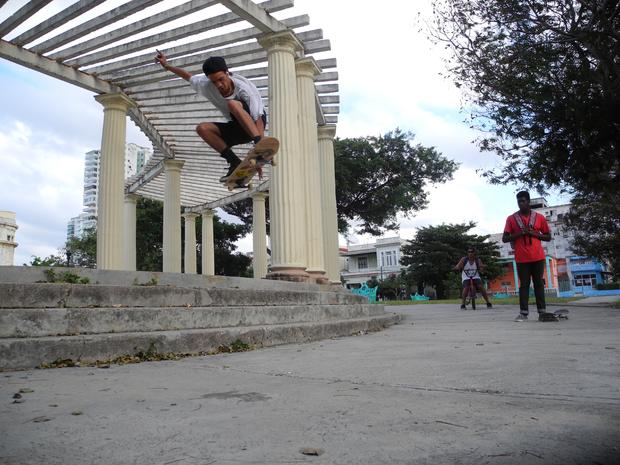U.S.-Cuba thaw provides new hope for a niche sport in Havana
Havana's El Patinodromo ("The Skatepark") is 20,000 sq. feet of metal ramps, rails, and low, concrete steps. To Cuba's burgeoning skate scene, it's an oasis -- the only skatepark on the island where skaters can grind, kickflip, and catch some air without getting ticketed by police officers.
But it's also fallen into disrepair: the heat and humidity of Cuba's tropical climate have made ramps rusty, the concrete has cracked, and before they can land any tricks, skaters have to improvise supports for its various obstacles.
"They used to be nice metal ramps," skateboarder and Washington D.C. native Miles Jackson told CBS News. He's traveled to Cuba a dozen times and always makes a point to visit El Patinodromo. "About fifteen years ago, Red Bull went to Cuba and donated these ramps. But with the weather conditions and climate...it needs a lot of work."
Cuba Skate, the D.C.-based nonprofit Jackson started five years ago to promote skateboarding culture on the island, has worked on various ad hoc renovations to El Patinodromo. When Cuba Skate team members travel to Cuba, usually bringing with them a trove of skateboard donations and apparel, they'll do what they can to gather sand and cement at the skate park to make new obstacles and improve old ones.
Jackson's ultimate vision is to build a new skatepark in Cuba -- either on the existing foundations of El Patinodromo or in another area entirely.
"Having a skate park would be like the Mecca or the center of skateboarding -- a safe place for kids to go that's not as dangerous as the streets," Jackson, who has had to help sort out the occasional tussle between cops and Cuban youth skating in public places, told CBS News. "They could learn, practice on a daily level, and in a good environment."
But even with a new skate park, Cuba is a difficult place to harbor any dreams of professional skateboarding.
There are no skate shops on the island -- no means to get replacement decks, wheels, or shoes. Any equipment for skating has come from outside Cuba and is sold black market.
That's where Cuba Skate comes in. Since its founding in 2010, Cuba Skate has made a total of 12 trips down to the island. Jackson estimates that they've donated over 500 complete boards -- including decks, griptape, trucks, wheels, bearings -- and over 200 pairs of skate shoes. National sponsors have taken notice of their work, and Cuba Skate frequently engages with popular skate brands like Bones, Deluxe Distribution, and Converse for donations.
"We don't have any money; we don't have any funding. We've always reached out to people for decks, wheels, whatever," Willem Morin, Cuba Skate's vice president, said. "And we have to personally take them down, since we can't ship anything to Cuba. That's just part of the regulations. It may be changing."
With U.S. embargoes on Cuba and restricted travel access, any contributions must be physically brought over by individual Cuba Skate members themselves. It's a daunting task, when the equipment weighs in at dozens of pounds well over the baggage maximums at airports.
But on Monday, the U.S. officially normalizes diplomatic relations with Cuba and re-opens its embassies, after nearly sixty years of strained ties.
For the nonprofit, it could open up the possibility of shipping their skate supplies to Cuba, instead of singlehandedly lugging their gear through TSA at the airport in Washington, D.C., paying overage fees for their baggage, and facing Cuban customs once they arrive in Havana.
When traveling to Cuba, "if you go down there with ten bags, the government thinks you're selling the products to make money," Jackson said, citing the dangers of purveying black market goods. "So we're interested in working with the State Department to have them help send products direct to the embassy to be in Havana through shipping containers and instead of taking 20 boards, we can take a thousand boards."
"You know, if your board breaks, sometimes you might not get a board for two months," Jackson added. For Cuban youth, to buy a board on the black market could mean shelling out the equivalent of $150 for a board that would cost about half that in the U.S. For a country whose average income is $20 per month, it's a nearly impossible purchase. "To be able to develop at that stage -- to be able to jump down a ten-stair knowing that your board might break and you can't try that again for a month or two -- is a challenge."
Despite hopes that all sectors of the Cuban economy will soon improve, U.S. skeptics of the existing Castro regime remain, and the president's decision to officially open diplomatic relations with Cuba swiftly came under intense criticism from GOP candidates and congressman. Republican lawmakers are unlikely to lift the trade embargo and have promised to block funding for the U.S. embassy, as well as the confirmation of the yet-to-be-named ambassador.
These potential political obstacles are not likely to deter Cuba Skate members, and the resumption of formal relations between the U.S. and Cuba means there are still avenues to ease the flow of skater aid.
Working with the Georgetown University Law Center and law firm Foley & Lardner, the nonprofit is working to submit to the U.S. State and Treasury Departments' Office of Foreign Assets Control application. If approved, they can legally operate with an arm in Cuba, no matter what 2016 holds. They're also engaged in talks with INDER (Instituto Nacional de Deportes, Educación Fisica, y la Recreación), Cuba's government body overseeing sports and physical education on the island.
"We want to make sure we go through all of these hurdles now. In case the new administration coming in sort of does an about-face on recent events," Morin said. "And if things change, we'll have to change with it. But we'll do whatever it takes to get the skatepark done."
Already, the State Department is considering the possibility of its principal sports diplomacy program, SportsUnited, taking on the skateboarding cause in the country.
"A critical component of the President's new direction on Cuba is supporting exchanges of culture, ideas, and resources to, from and throughout the island of Cuba," a State Department official told CBS News. "We have participated in preliminary discussions with Cuba Skate about the possibility of SportsUnited facilitating sports programming in Cuba involving skateboarding as way of engaging youth audiences in the country."
In a conversation with Jackson in May, Havana native Orlando Rosales said he can already "feel the change." But the 23-year-old skateboarder, part of the Havana-based 23yG skate team that's blossomed in the years since Cuba Skate has started its operations, added that the improvements haven't yet started to trickle down.
"For the country, there's more tourism -- and that's cool. That's good," Rosales said. "But for me, myself, personally, in my daily life, I haven't seen any changes."
"They want to see new opportunities, new jobs -- you know, the potential to open up their own skate shop," Jackson added. "So they can invest, and create these things that aren't just black market but that are mainstream."


